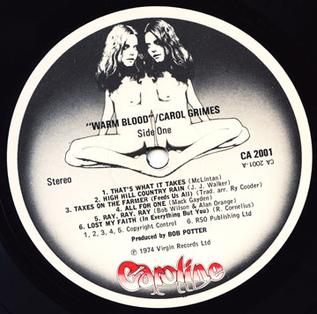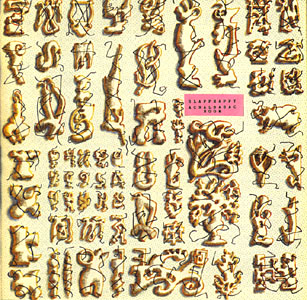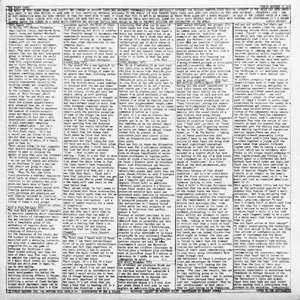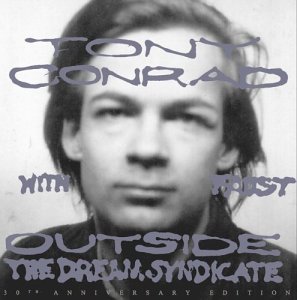
Anthony Schmalz Conrad was an American video artist, experimental filmmaker, musician, composer, sound artist, teacher, and writer. Active in a variety of media since the early 1960s, he was a pioneer of both drone music and structural film. As a musician, he was an important figure in the New York minimalist scene of the early 1960s, during which time he performed as part of the Theatre of Eternal Music. He became recognized as a filmmaker for his 1966 film The Flicker. He performed and collaborated with a wide range of artists over the course of his career.

Faust are a German rock band from Hamburg. Formed in 1971 by producer and former music journalist Uwe Nettelbeck, the group was originally composed of Werner "Zappi" Diermaier (b.1949), Hans Joachim Irmler (b.1950), Arnulf Meifert, Jean-Hervé Péron (b.1949), Rudolf Sosna and Gunther Wüsthoff, working with engineer Kurt Graupner. Their work was oriented around dissonance, improvisation, and experimental electronic approaches, and would influence subsequent ambient and industrial music. They are considered a central act of West Germany's 1970s krautrock movement.

Caroline Records is a record label originally founded in 1973. Initially founded in the United Kingdom to showcase British progressive rock groups, the label ceased releasing titles in 1976, and then re-emerged in the United States in 1986. The label released the work of American punk rock, thrash metal and new wave music bands. Caroline had a number of subsidiary labels, including Astralwerks, Gyroscope, Caroline Blue Plate, Beat the World, Scamp and Passenger. In 2013, the brand was relaunched by Universal Music via the Capitol Music Group.
Krautrock is a broad genre of experimental rock that developed in West Germany in the late 1960s and early 1970s. It originated among artists who blended elements of psychedelic rock, avant-garde composition, and electronic music, among other eclectic sources. Common elements included hypnotic rhythms, extended improvisation, musique concrète techniques, and early synthesizers, while the music generally moved away from the rhythm & blues roots and song structure found in traditional Anglo-American rock music. Prominent groups associated with the krautrock label included Neu!, Can, Faust, Tangerine Dream, Kraftwerk, Cluster, Ash Ra Tempel, Popol Vuh, Amon Düül II and Harmonia.

Cluster were a German musical duo consisting of Hans-Joachim Roedelius and Dieter Moebius, formed in 1971 and associated with West Germany's krautrock and kosmische music scenes. Born from the earlier Berlin-based group Kluster, they relocated in 1971 into the countryside village of Forst, Lower Saxony, where they built a studio and collaborated with musicians such as Conny Plank, Brian Eno, and Michael Rother; with the latter, they formed the influential side-project Harmonia. After first disbanding in 1981, Cluster reunited several times: from 1989 to 1997, and from 2007 to 2010.

Harmonia was a West German musical "supergroup" formed in 1973 as a collaboration between members of two prominent krautrock bands: Cluster's Hans-Joachim Roedelius and Dieter Moebius joined by Neu! guitarist Michael Rother. Living and recording in the rural village of Forst, the trio released two albums—Musik von Harmonia (1974) and Deluxe (1975)—to limited sales before dissolving in 1976. AllMusic described the group as "one of the most legendary in the entire krautrock/kosmische scene."

Acnalbasac Noom is a studio album by German-British avant-pop group Slapp Happy, recorded in Wümme, Bremen, Germany in 1973 with Faust as their backing band. It had a working title of Casablanca Moon but was never released at the time because it had been rejected by their record label, Polydor. Slapp Happy later re-recorded the album in 1974 for Virgin Records, who released it in 1974 as Slapp Happy. The original 1973 recording of Casablanca Moon, was released as Slapp Happy or Slapphappy by Recommended Records in 1980, and reissued as Acnalbasac Noom in 1982. The title Acnalbasac Noom appears in the lyrics of the song "Casablanca Moon", and is Casablanca Moon with the words written backwards.
Ash Ra Tempel was a West German krautrock group led by guitarist Manuel Göttsching that was active from 1970 to 1976. Their debut album Ash Ra Tempel was released in 1971. Following the band's demise, Göttsching released music under the name Ashra.

Faust So Far, also simply called So Far, is a 1972 album by German krautrock group Faust. This, the band's second studio album, has a more commercially typical structure than its predecessor; it comprises nine separate tracks, each consisting of an individual and distinct musical style or theme.

Faust IV is the fourth studio album by the German krautrock group Faust, released in 1973. The album is included in the book 1001 Albums You Must Hear Before You Die, where it is referred to as a "krautrock classic". This was the last album by the first incarnation of the band, they returned in 1994 with the release of Rien featuring a different line-up.

Sort Of is the debut studio album by the avant-rock band Slapp Happy. It was recorded in Wümme, Bremen, Germany in May and June 1972 with Faust as their backing band, and released on LP by Polydor Records in 1972. In 1980 Recommended Records released a limited edition of Sort Of on LP, and the album was reissued on CD by Blueprint Records in 1999 with one bonus track.

Geoff Leigh is an English jazz and progressive rock musician, playing primarily soprano saxophone and flute. He was a member of the English avant-rock group Henry Cow and founded several bands himself, including Red Balune, Random Bob, Black Sheep, Mirage, and Ex-Wise Heads.

The Faust Tapes is the third album by the German krautrock group Faust, released in 1973. The album sold well in the United Kingdom because of a marketing gimmick by Virgin Records that saw it go on sale for the price of a single. This exposure introduced British audiences to Faust.

Uwe Nettelbeck was a German record producer, journalist and film critic. He was best known as the creator and producer of the German krautrock band Faust and changed the face of German rock music in the early 1970s. He was also one of Germany's leading film critics in the 1960s.

Outside the Dream Syndicate is a 1973 album by United States avant-garde composer Tony Conrad in collaboration with German krautrock group Faust. The album marks Conrad's first and only musical release for many years, and remains his best known musical work. It is considered a classic of minimalist and drone music. Pitchfork exclaims "for a moment in Outside the Dream Syndicate, one forgets what exactly is moving and what is standing still."

Rien is a 1994 album by the German krautrock group Faust. It was their fifth album, and their first reunion album. The album was produced by Jim O'Rourke.

You Know FaUSt is a 1996 album by the German krautrock group Faust. It is their sixth album.

Ravvivando is the 8th album by the German krautrock group Faust, released in 1999. A vinyl edition was released about a year later including a bonus track not included on the CD edition.

Something Dirty is the 11th studio album by the German krautrock group Faust, released in 2011.

Romantic Warriors IV: Krautrock is a trilogy of feature-length documentaries about progressive music written and directed by Adele Schmidt and José Zegarra Holder. RW4 focuses on the progressive rock music from Germany popularly known as Krautrock, although the integration of Krautrock into the progressive rock genre is a purely American notion. In Europe, the conventional wisdom is that Krautrock can be considered at most as the connection between psychedelic rock and progressive rock. The term "Krautrock" was applied after-the-fact by British journalists, and in fact the German bands share very few similarities.

















